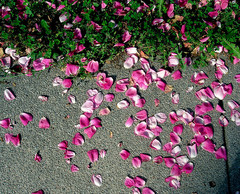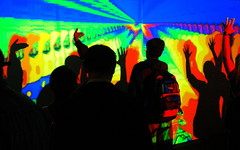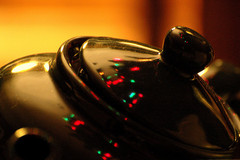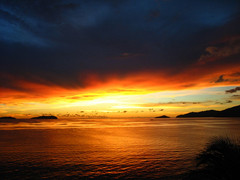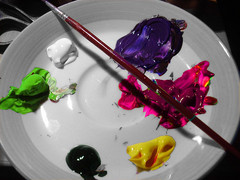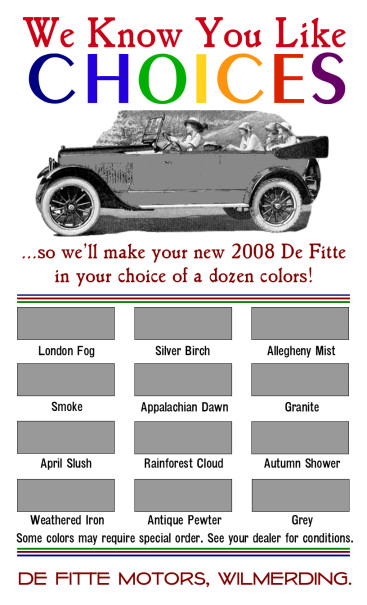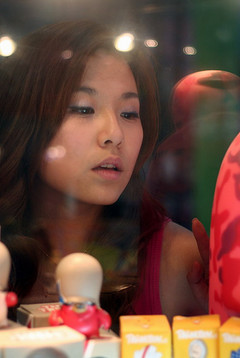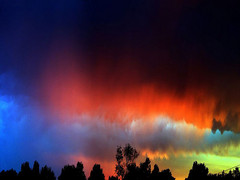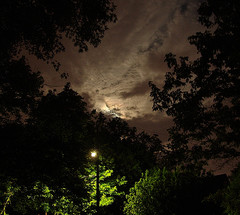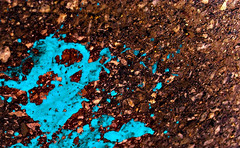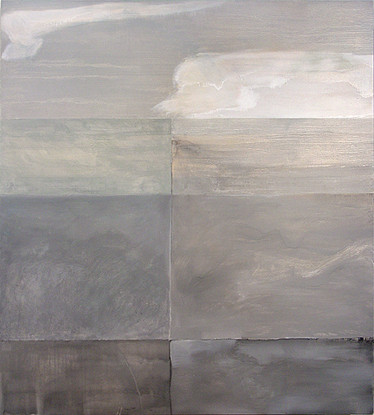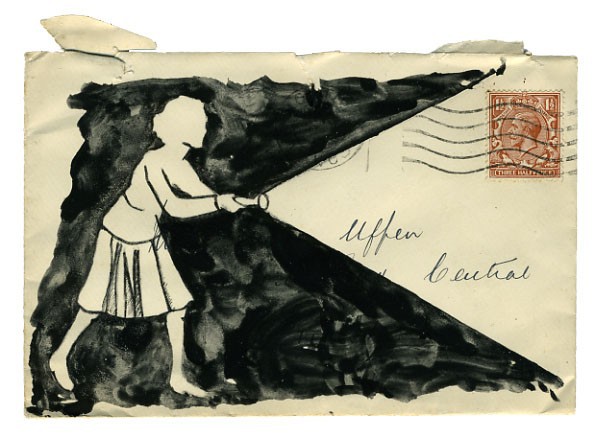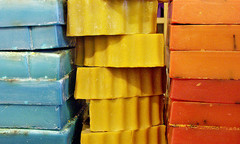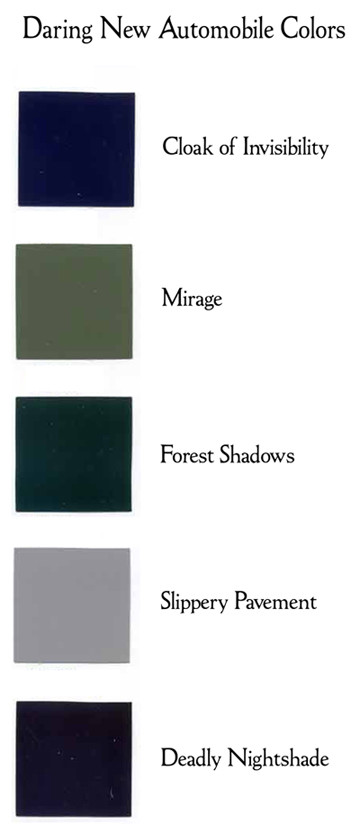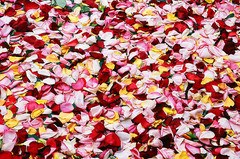Colorful Allusions
Though printed in black and white, great literature is bursting with vibrant colour. In these rebus-style puzzles, color words and parts of words have been replaced with colored boxes. Try to guess the exact hue of each. Roll your mouse over the colored boxes to reveal the missing words. Click the colored boxes to learn more about each hue. Special thanks to Paul Dean for his colorful research. |


 |
|
|
 |
 |
 |
Some scientists (especially physicists) [and] some artists (especially musicians) . . . noticed long ago that a musical sound, for example, provokes an association of a precise color. . . . Stated otherwise, you ‘hear’ the color and you ‘see’ the sound. . . .
YELLOW . . . possesses the special capacity to ‘ascend’ higher and higher and to attain heights unbearable to the eye and the spirit; the sound of trumpet played higher and higher becoming more and more ‘pointed,’ giving pain to the ear and to the spirit. BLUE, with the completely opposite power to ‘descend’ into infinite depths, develops the sounds of the flute (when it is light blue), of the cello (when it has descended farther), of the double bass with its magnificent deep sounds; and in the depths of the organ you ‘see’ the depths of blue. GREEN is well balanced and corresponds to the medium and the attenuated sounds of the violin. When skillfully applied, RED (vermillion) can give the impression of strong drum beats, etc.”
—Wassily Kandinsky, Concrete Art, 1938.
|



 |
|
|
 |
 |
 |
The sunset was magnificent with the intensity and brilliance that can be found only in the tropics. . . . It was a sensual isle, a Biblical land of ruby wines and golden sands and indigo trees. The men stared and stared. The island hovered before them like an Oriental monarch’s conception of heaven, and they responded to it with an acute and terrible longing. It was a vision of all the beauty for which they had ever yearned, all the ecstasy they had ever sought. . . . It could not last. Slowly, inevitably, the beach began to dissolve in the encompassing night. The golden sands grew faint, became gray- green, and darkened. The island sank into the water, and the tide of night washed over the rose and lavender hills. After a little while, there was only the gray- black ocean, the darkened sky, and the evil churning of the gray- white wake. Bits of phosphorescence swirled in the foam. The black dead ocean looked like a mirror of the the night; it was cold, implicit with dread and death. The men felt it absorb them in a silent pervasive terror. They turned back to their cots, settled down for the night, and shuddered for a long while in their blankets.
—Norman Mailer, The Naked and the Dead, 1948.
|

 |
|
|
 |
 |
 |
Among colours, such as are soft and cheerful (except, perhaps, a strong red which is cheerful) are unfit to produce grand images. An immense mountain, covered with a shining green turf, is nothing, in this respect, to one dark and gloomy; the cloudy sky is more grand than the blue, and night more sublime and solemn than day. Therefore in historical painting, a gay or gaudy drapery can never have a happy effect: and in buildings, when the highest degree of the sublime is intended, the materials and ornaments ought neither to be white, nor green, nor yellow, nor blue, nor of a pale red, nor violet, nor spotted, but of sad and fuscous colours, as black, or brown, or deep purple, and the like.
—Edmund Burke, A Philosophical Enquiry into the Origin of Our Ideas of the Sublime and Beautiful, 1806; as quoted by Marjorie Hope Nicolson in Newton Demands the Muse, 1946.
|


 |
How is it possible still to see the human face pink, now that our life, redoubled by noctambulism, has multiplied our perceptions as colorists? The human face is yellow, red, green, blue, violet. The pallor of a woman gazing in a jeweller’s window is more intensely iridescent that the prismatic fires of the jewels that fascinate her like a lark.
—F.T. Marinetti,Futurist Painting: Technical Manifesto, 1910.
|

 |
|
|
 |
 |
 |
At thee the ruby lights its deepening flow, / And with a saving radiance inward flames. / From thee the sapphire, solid ether, takes / Its hue cerulean; and, of evening tinct, / The purple- streaming amethyst is thine. / With thy own smile the yellow topaz burns; / Nor deeper verdure dyes the robe of Spring, / When first she gives it to the southern gale, / Than the green emerald shows. But, all combined, / Thick through the whitening opal play thy beams; / Or, flying from its surface, form / A trembling variance of revolving hues / As the site varies in the gazer’s hand.
—James Thomson, "Summer," quoted by Marjorie Hope Nicolson in Newton Demands the Muse, 1946.
|


 |
|
|
 |
 |
 |
If you ask me, there's something just plain wrong about a red sky, and it doesn't really matter what time it is, either. Sailors may delight in a red sky at night, but I don't even have a boat. Red is the color of blood, and I hate seeing it outside my body, or yours. Roses are red, especially after I bleed all over them because the thorns stabbed me when I wasn't looking.
My eyes are red every day after my shower because I always get soap in them. It hurts. Fire trucks are red, and so is communism. When I hear sirens I think about air raids, or someone's house burning down. When I have a cold, my nose gets red from all the blowing and wiping. I don't feel good when I eat red meat, and red wine gives me a headache. Diaper rash is red.
I hate red.
—Jeff, "Why I Hate Red," Omegaword, 2008
|


 |
|
|
 |
 |
 |
Some range the colours as they parted fly, / Clear- pointed to the philosophic eye; / The flaming red, that pains the dwelling gaze, / The stainless, lightsome yellow’s gilding rays; / The clouded orange, that betwixt them glows, / And to kind mixture tawny lustre owes; / All- chearing green, that gives the spring its dye; / The bright transparent blue, that robes the sky; / And indico, which shaded light displays, / And violet, which in the view decays.
—Richard Savage, The Wanderer, quoted by Marjorie Hope Nicolson in Newton Demands the Muse, 1946.
|

 |
|
|
 |
 |
 |
"Certainly London fascinates. One visualizes it as a tract of quivering grey, intelligent without purpose, and excitable without love; as a spirit that has altered before it can be chronicled; as a heart that certainly beats, but with no pulsation of humanity." — E.M. Forster, Howards End, 1910. |




 |
|
|
 |
 |
 |
The Land of Ultimate Bliss has pools of the seven jewels, filled with the eight waters of merit and virtue. The bottom of each pool is pure, spread over with golden sand. On the four sides are stairs of gold, silver, lapis lazuli, and crystal; above are raised pavilions adorned with gold, silver, lapis lazuli, crystal, mother- of- pearl, red pearls, and carnelian.
In the pools are lotuses as large as carriage wheels: green colored of green light; yellow colored of yellow light; red colored of red light; white colored of white light; subtly, wonderfully, fragrant and pure. . . .
[I]n that Buddhaland, when the soft wind blows, the rows of jewelled trees and jewelled nets give forth subtle and wonderful sounds, like one hundred thousand kinds of music played at the same time.
—Buddha, The Amitabha Sutra, as translated by Ronald Epstein, 1970.
|

 |
|
|
 |
 |
 |
Through his half- open eyes he saw hands holding flowers — thin hands, fine hands; but hands that belonged to no one. And were they flowers the hands held? Or mountains? Blue mountains with violet shadows? Then petals fell. Pink, yellow, white, with violet shadows, the petals fell. They fall and fall and cover all, he murmured. And there was the stem of a wine- glass; the rim of a plate; and a bowl of water. The hands went on picking up flower after flower; that was a white rose; that was a yellow rose; that was rose with violet valleys in its petals. There they hung, many folded, many coloured, drooping over the rim of the bowl. And petals fell. There they lay, violet and yellow, little shallops, boats on a river. And he was floating, and drifting, in a shallop, in a petal, down a river. . . .
—Virginia Woolf, The Years, 1937.
|

Page 13 of 18

> Older Entries...

Original Content Copyright © 2026 by Craig Conley. All rights reserved.
|



